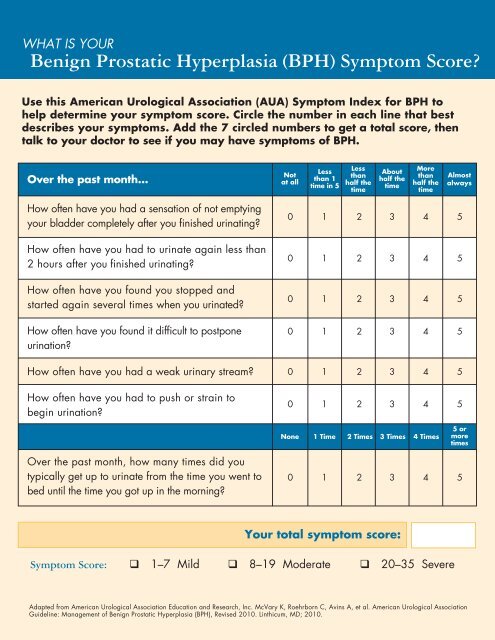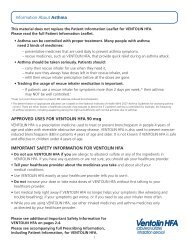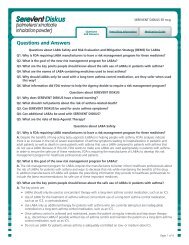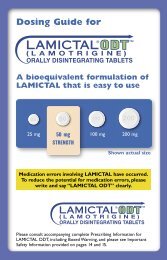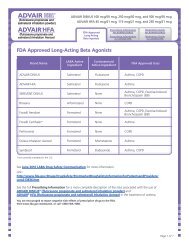Benign Prostatic Hyperplasia (BPH) Symptom Score? - GSK Source
Benign Prostatic Hyperplasia (BPH) Symptom Score? - GSK Source
Benign Prostatic Hyperplasia (BPH) Symptom Score? - GSK Source
Create successful ePaper yourself
Turn your PDF publications into a flip-book with our unique Google optimized e-Paper software.
What is Your<br />
<strong>Benign</strong> <strong>Prostatic</strong> <strong>Hyperplasia</strong> (<strong>BPH</strong>) <strong>Symptom</strong> <strong>Score</strong>?<br />
Use this American Urological Association (AUA) <strong>Symptom</strong> Index for <strong>BPH</strong> to<br />
help determine your symptom score. Circle the number in each line that best<br />
describes your symptoms. Add the 7 circled numbers to get a total score, then<br />
talk to your doctor to see if you may have symptoms of <strong>BPH</strong>.<br />
Over the past month...<br />
Not<br />
at all<br />
Less<br />
than 1<br />
time in 5<br />
Less<br />
than<br />
half the<br />
time<br />
About<br />
half the<br />
time<br />
More<br />
than<br />
half the<br />
time<br />
Almost<br />
always<br />
How often have you had a sensation of not emptying<br />
your bladder completely after you finished urinating?<br />
How often have you had to urinate again less than<br />
2 hours after you finished urinating?<br />
How often have you found you stopped and<br />
started again several times when you urinated?<br />
How often have you found it difficult to postpone<br />
urination?<br />
How often have you had a weak urinary stream?<br />
How often have you had to push or strain to<br />
begin urination?<br />
0 1 2 3 4 5<br />
0 1 2 3 4 5<br />
0 1 2 3 4 5<br />
0 1 2 3 4 5<br />
0 1 2 3 4 5<br />
0 1 2 3 4 5<br />
None 1 Time 2 Times 3 Times 4 Times<br />
5 or<br />
more<br />
times<br />
Over the past month, how many times did you<br />
typically get up to urinate from the time you went to<br />
bed until the time you got up in the morning?<br />
0 1 2 3 4 5<br />
Your total symptom score:<br />
<strong>Symptom</strong> <strong>Score</strong>: q 1–7 Mild q 8–19 Moderate q 20–35 Severe<br />
Adapted from American Urological Association Education and Research, Inc. McVary K, Roehrborn C, Avins A, et al. American Urological Association<br />
Guideline: Management of <strong>Benign</strong> <strong>Prostatic</strong> <strong>Hyperplasia</strong> (<strong>BPH</strong>), Revised 2010. Linthicum, MD; 2010.
UNDERSTANDING<br />
<strong>Benign</strong> <strong>Prostatic</strong> <strong>Hyperplasia</strong> (<strong>BPH</strong>)<br />
Normal Anatomy<br />
The prostate gland sits below the bladder and surrounds the<br />
urethra—the tube through which urine and semen pass out of<br />
the body. Normally the prostate is about the size of a walnut.<br />
Bladder<br />
What is <strong>BPH</strong>?<br />
<strong>BPH</strong> is a growth in the number<br />
of cells in the prostate.<br />
• The cause of <strong>BPH</strong> is not<br />
well understood.<br />
• Some men over the age<br />
of 50 may experience<br />
prostate growth.<br />
• In some men this prostate<br />
growth may cause<br />
urinary symptoms.<br />
Prostate cross-section view<br />
Normal<br />
Prostate cells<br />
Prostate cell<br />
growth in <strong>BPH</strong><br />
Ejaculatory<br />
duct<br />
Prostate<br />
Normal Anatomy<br />
Bladder<br />
neck<br />
Urethra<br />
Urine flow<br />
restricted<br />
Because of the prostate’s location in the body, when it<br />
enlarges it can narrow the tube carrying urine out of<br />
the body and obstruct the emptying of the bladder.<br />
The following urinary symptoms may all be signs of <strong>BPH</strong>:<br />
• Feeling the need to urinate frequently<br />
• Difficulty starting to urinate<br />
Enlarged<br />
prostate<br />
<strong>BPH</strong><br />
Urethra gets<br />
squeezed<br />
• Difficulty emptying your bladder completely, and because<br />
of this, urine may dribble when you are done<br />
Urine flow<br />
restricted<br />
• The stream of your urine is weak and may start and stop<br />
• Frequently urinating at night<br />
• Sudden strong urges to urinate<br />
If you have any of these symptoms, talk to your doctor.<br />
If you have <strong>BPH</strong>, your doctor will help you find a<br />
treatment plan that is right for you.<br />
Normal prostate<br />
size for comparison<br />
Urethra gets<br />
squeezed<br />
<strong>Symptom</strong>atic <strong>BPH</strong> IN MAN WITH<br />
AN ENLARGED PROSTATE<br />
©2013 GlaxoSmithKline group of companies. All rights reserved. Produced in USA. AVV829R0 May 2013


